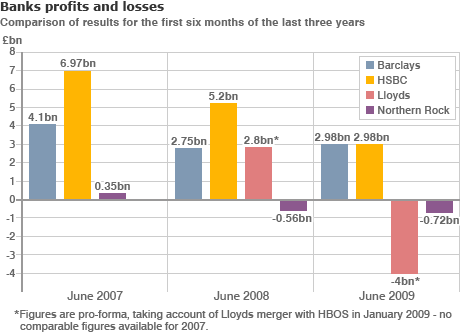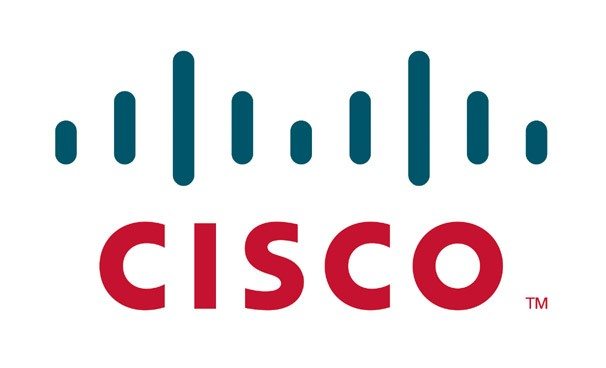
The UK banks announce their half year results this week (results are provided at the end of this entry, as they are released). And the results look good. Not great, but good.
This follows on the US banks second quarter results, with Goldman Sachs reporting record profits that were twice as good as expected, and even Citi and BoA reporting profitability, albeit thanks to sales of key assets. The rest has been down to a good investment banking run, with a strong stock market rally and benign yields on fixed–income products.
The UK banks don’t have quite the same conditions, although Barclays should see a strong surge thanks to Barclays Capital. Like the US investment banks, Barclays has the strongest trading desk of the big UK banks. They’re also benefiting from picking up the best and most profitable parts of Lehman Brothers American operations last year and, all in all, this strength will be demonstrated in very strong results.
Barclays were also the bank that had a share price that sank to just under 48p at one point which also reflected the issues of taking over Lehmans and the volatility of Q4 2008. But now, the share price is up over £3:00 in latest trading, a six–times multiplier on a January investment, and all is good.
This is well demonstrated by by the Abu Dhabi investment fund. The fund has made a 73 percent profit so far on their investment after only eight months. Not bad for a loan that allowed Barclays to escape the UK governments clutches.
Result? Abu Dhabi decides to invest in Richard Branson’s space project, Virgin Galactic. Mind you, if you’re making that sort of profit, you would have money to burn wouldn’t you?
Barclays has had a few ups and downs this half–year though, as their dealmaker of the Middle Eastern bailout was Roger Jenkins. Roger Jenkins is one of the most critical players in Barclays’ investment banking operations, and he recently announced he was leaving.
But things overall are good in the Barclays camp which is why they filched the trading desk of Royal Bank of Scotland recently, which bring us on to RBS.
RBS will still have issues and are expected to report a loss. In fact, they’re expected to report a big loss as Stephen Hester, their CEO, is rumoured to be throwing in as much bad news now as he can. Nevertheless, he could be right to do so as, after Q1 reporting, there was a fascinating analysis in the FT about RBS and their asset backed securities.
In the Alphaville blog, the FT had an April article called: “Black swans, black sheep in the world’s biggest balance sheet”.
The FT had spotted in RBS reports that “impairment losses and credit market write–downs totalling £4,927 million ... were partly offset by gains on the fair value of own debt of £647 million.”
What this gets at is fair value accounting and who some screwy book–keeping can make paper profits and losses.
For example, RBS held £92 billion worth of asset–backed securities (ABS) in 2008, shrinking to £86 billion at the end of Q1 2009.
The article then goes on about complex investment banking stuff about hedgies and monoclines, but the reason I pickup on this is that discussion about ‘fair value’. Last year, RBS and the other UK banks were forced to write–down paper losses on assets that were far bleaker than the reality.
This is the nature of IFRS accounting and mark–to–market rules. The result is that the banks appeared to be haemorrhaging losses. What it forgets is that the assets that back those paper–based securities are still assets and, under fair value accounting rules, the write–downs made in 2007–2008 are now being written back in 2009.
This is why RBS should deliver a profit, although it’s a smaller one than expected thanks to Mr. Hester’s conservative approach.
Unlike Lloyds.
Lloyds Banking Group are also writing off major losses on their debt book. These losses will be the largest of all the banks, about £11 billion worth of the £32 billion expected across all UK banks, and relate to mortgage, credit card and other credit related losses. These are the losses that are the reason for banks to still be cautious about lending generally.
However, even with this big loss, I’m still thinking Lloyds will turn a small profit thanks to the accounting technicalities of fair–value accounting along with phenomenal operating profits. According to what I’m hearing, Lloyds delivered a £7 billion operating profit in the first half of this year thanks to low costs of borrowing due to low interest rates, whilst maintaining high costs of borrowing to customers, in line with the general markets. Add to this gains on write–offs last year, under fair value rules, and Lloyds like RBS will turn a profit.
Unlike the shock of HSBC.
HSBC should be delivering solid results, and usually do, thanks to their globally diversified portfolio. Trouble is, they took over household in the USA just before the subprime disaster hit and, as a result, have written off more losses than any other bank. Over $50 billion worth. No wonder they have activist shareholders baying for blood.
But read a little further between the lines of HSBC’s balance sheet, and you will see that it’s not as bad as it looks. Why? Because the same accounting rules that will gift RBS and Lloyds some profitability will take away the solid performance of HSBC’s operations due to their £12.5 billion rights issue in March.
All in all, it’s going to be a pretty topsy–turvy week ... except that John Varley and his merry crew will be enjoying the surge of being the only UK bank that can claim to be making a profit without using creating accounting ... this time.
[If you want an alternative analysis for this week's banking results, the BBC has a good summation]
UPDATE #1 8:45, 3rd August
Barclays make £2.98 billion profit
Profits at Barclays Capital, the bank's investment arm doubled to £1.05bn from £524m, boosted by its acquisition of Lehman Brothers in the US and strong debt, currency and commodities revenues.
But a rise in impairments to £4.56bn, up 86pc from £2.45bn a year ago, dragged profit in UK retail banking down 61pc to £268m and knocked its commercial bank profits 42pc lower to £404m.
Barclays Capital reported a £4.68bn writedown on credit market exposures, including impairment on loans of £1.17bn. There was another £3.39bn in other group impairments and credit provisions.
UPDATE #2 9:30, 3rd August
HSBC global profits slip to $5bn
Banking group HSBC has reported pre-tax profits of $5bn (£2.98bn) for the first six months of 2009. The figure is about half what it made in the same period a year ago.
Bad debts halve HSBC's profits
UPDATE #3 17:00, 4th August
Good analysis of UK bank capital ratio's:
BARCLAYS (BARC.L) (Pro forma June 30, 2009**):
Tier 1 capital 47 billion pounds
Core Tier 1 capital ratio 8.8 percent
Tier 1 capital ratio 11.7 percent
Presents the impact of the sale of the Barclays Global Investors business to BlackRock Inc.
HSBC (HSBA.L) (June 30, 2009):
Tier 1 capital $117.35 billion
Core Tier 1 capital ratio 8.8 percent
Tier 1 capital ratio 10.1 percent (June 30, 2009)
LLOYDS BANKING GROUP (LLOY.L):
Tier 1 capital 13.7 billion pounds (2008)
Core Tier 1 capital ratio 6.4 percent (January 2009)
Tier 1 capital ratio 9.8 percent (January 2009)
RBS (RBS.L):
Tier 1 capital 69.84 billion pounds (2008)
Core Tier 1 capital ratio 6.7 percent (March 31, 2009)
Tier 1 capital ratio 9.9 percent (March 31, 2009)
STANDARD CHARTERED (STAN.L) (2888.HK):
Tier 1 capital $21.51 billion (June 30, 2009)
Core Tier 1 capital ratio 8.4 percent
Tier 1 capital ratio 11.5 percent
Pro forma August 4, 2009, reflecting 1 billion pound ($1.7 billion) fundraising
NORTHERN ROCK (NRKx.L)
Tier 1 capital after deductions 0.5 million pounds
(June 30, 2009)
Sources: Reuters; Company reports
UPDATE #4 22:30, 5th August
Lloyds rallies despite £4bn loss (BBC)
Shares in Lloyds Banking Group surged by 11%
despite its announcement of a £4bn loss in the first half of 2009, due
to mounting bad debts at HBOS. Comments that most bad news was now out and that future results would improve had heartened investors, said analysts. The
group, which is 43% owned by UK taxpayers, said £13bn of loans and
investments had turned bad, most of them from Halifax Bank of Scotland. It predicted future such charges for bad loans would be smaller.

Source: BBC
UPDATE #6, 14:00 7th August
RBS cautious after reporting £1bn losst (Financial Times)
Royal Bank of Scotland on Friday said its results were likely to be poor for the next two years as it reported a net loss of £1bn for the first half of 2009 following a quintupling of impairment charges to £7.5bn.
RBS, which is 70 per cent owned by the UK government, said the buoyant performance of its investment banking arm, whose £4.9bn operating profit saved it from posting a worse interim loss, was “likely to weaken substantially in the second half”.
RBS Presentation of Results (100 page pdf)
UP*
The Finanser is sponsored by Vocalink
and Cisco:

For details of sponsorship email us.
Chris M Skinner
Chris Skinner is best known as an independent commentator on the financial markets through his blog, TheFinanser.com, as author of the bestselling book Digital Bank, and Chair of the European networking forum the Financial Services Club. He has been voted one of the most influential people in banking by The Financial Brand (as well as one of the best blogs), a FinTech Titan (Next Bank), one of the Fintech Leaders you need to follow (City AM, Deluxe and Jax Finance), as well as one of the Top 40 most influential people in financial technology by the Wall Street Journal's Financial News. To learn more click here...

